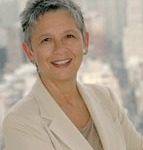More than 50 years ago Rachel Carson noted how chemicals could travel through soil, water and air, accumulate in creatures’ bodies and impact their health. She had a hunch that the “better living through chemistry” paradigm of her time was shortsighted and detrimental. Human bodies contain groups of organs that work together to perform functions, and that system can be agitated by the chemicals we put into it.
On World Environmental Health Day we need to look at our landscape in the way Rachel Carson did — through a systemic lens. As NGOs we respond to funder demands for measurable outcomes in the short term. We often focus on individual missions, individual goals, and individual tasks without considering the long-term strategy and impact. But we cannot afford to continue this shortsighted approach at the expense of human health.
We must think systemically about cancer.
In just a generation we’ve witnessed a 40-percent increase in incidence of breast cancer. With more scientific evidence emerging practically daily, it’s clear that our exposure to toxic chemicals and radiation are connected to our breast cancer risk, making the prioritization of prevention critical.
We know that most people diagnosed with breast cancer have no family history of the disease, and that exposure to toxic chemicals in our air, water and everyday products play an important role in increasing risk. Breast carcinogens — chemicals that directly cause breast cancer — are an obvious concern. But we also must pay attention to exposures to chemicals that disrupt the body’s hormones — chemicals known as endocrine-disrupting compounds — as well as to physical agents such as ionizing radiation.
The chemical industry — from industry chemists to engineers to manufacturers — has managed over time, and most dramatically since World War II, to position itself above the law. With its powerful lobbying presence, they have also become drivers of the system that fails to regulate. This broken system has thwarted innovation of green chemistry and processes that value human and environmental health.
We know that it doesn’t have to be this way.
In March 2014, the Breast Cancer Fund joined the Garfield Foundation, in partnership with the Lowell Center for Sustainable Production, BlueGreen Alliance, Jenifer Altman Foundation, Marisla Foundation, and the New York Community Trust, as part of an initiative that aims to protect millions of people by moving our economy away from hazardous materials and technologies.
This initiative will use a systems approach to weaning our economy from dependence on chemicals and other environmental factors known and reasonably suspected to cause cancer and other chronic diseases; and shifting investment toward products and processes that enhance health and well-being.
We feel strongly that in order to prevent breast cancer, we must think systematically with others in fields that touch this issue: everyone from scientists to entrepreneurs to governments. By doing this, we know we will be able to effect significant and sustainable change that will improve health for all.



